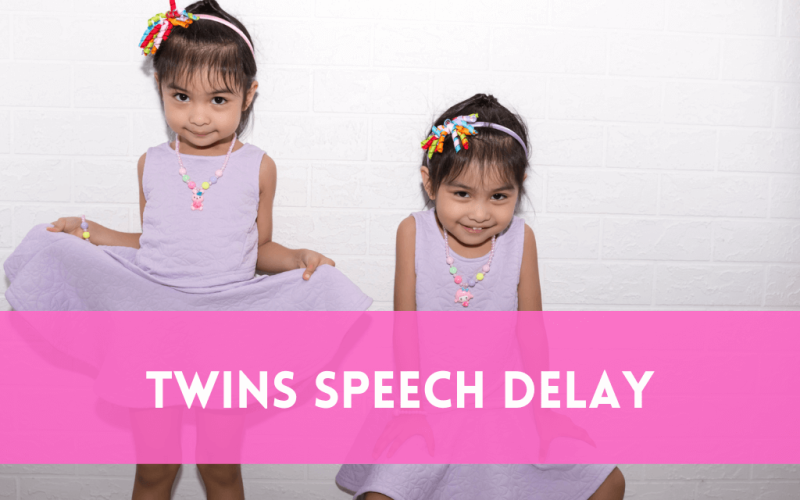Speech delay refers to a delay in a child’s ability to develop the language and communication skills that are expected for their age. Speech delay can involve difficulty with spoken language, such as producing sounds, putting words together to form sentences, or understanding language. It can also involve difficulty with nonverbal communication, such as gestures or facial expressions.
Speech delay is common in young children and can have various causes, such as hearing impairment, developmental disorders, or neurological conditions. It can occur at any age.
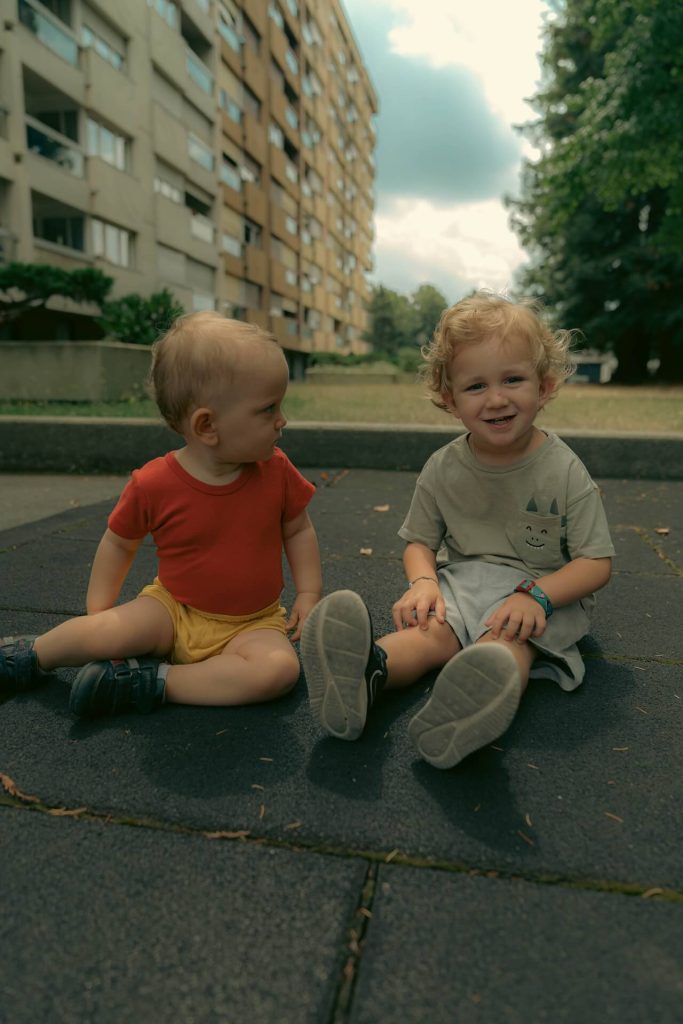
Typically, children begin to develop their language skills from a very early age. They may start making cooing and babbling sounds as early as 3-6 months. The first year of life is a critical period for language development, during which infants develop the ability to differentiate between different sounds.
By the age of one, they may have a few recognizable words in their vocabulary, too. By the age of two, most children are able to form simple sentences and communicate their basic needs. They continue to build on their language skills throughout early childhood, developing more complex vocabulary and grammar as they grow.
If you notice your twins having shorter utterance lengths or fewer overall attempts to talk or communicate, it might be a good idea to talk to your pediatrician or a speech-language pathologist. Early intervention would be quite helpful in evaluating your twins’ language skills and determining if there is, indeed, a delay that needs to be addressed.
Causes of Speech Delay

There are several potential causes of speech delay in children. Some of the most common causes include:
- Developmental delays: Some children may have a delay in their overall development, including speech and language development.
- Hearing loss: Children with hearing loss may have difficulty hearing and reproducing speech sounds, which can lead to speech delays.
- Intellectual disability: Children with intellectual disabilities may experience delays in their overall development, including speech and language development.
- Autism spectrum disorder: Children with autism may have difficulty with communication and social interaction, which can affect their speech and language development.
- Family history: Children may be more likely to experience speech delays if there is a family history of speech and language difficulties.
- Environmental factors: Children who do not receive enough exposure to language, or who are exposed to a language that is different from the language spoken at home, may experience delays in speech and language development.
Language Milestones

Language milestones refer to the typical stages of language development that children go through as they grow and learn to communicate. Here are some examples of important language milestones:
- Birth to 3 months: At this age, babies begin to make cooing and gurgling sounds, and respond to sounds and voices around them.
- 4 to 6 months: Babies begin to babble and make more varied sounds, and start to recognize familiar voices and sounds.
- 7 to 12 months: Babies begin to imitate sounds and gestures, and may say their first words around 12 months of age.
- 1 to 2 years: Toddlers begin to use more words and phrases, and start to combine words into short sentences. They may also start to follow simple directions and ask simple questions.
- 2 to 3 years: Toddlers continue to build their vocabulary and begin to use more complex sentences. They may also start to use pronouns correctly and ask more questions.
- 3 to 4 years: Preschoolers begin to use more descriptive words and engage in more complex conversations. They may also start to understand and use more abstract concepts, such as time and distance.
A delay or difficulty in a child’s ability to produce speech sounds, use language to communicate or understand language may indicate a speech delay.
Late Bloomer vs Speech Delay
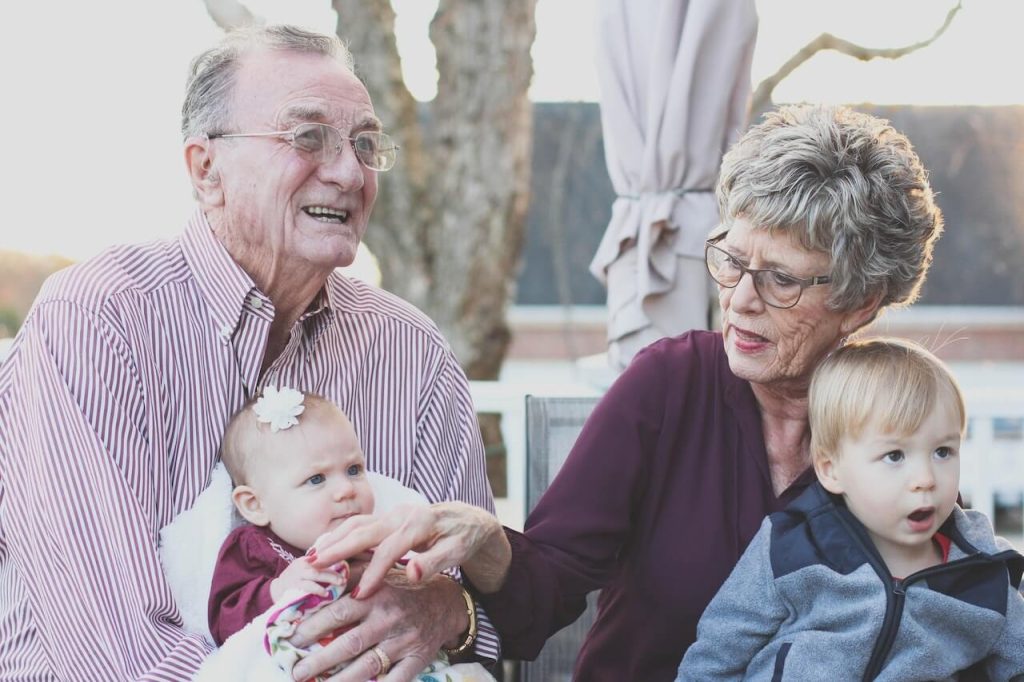
It can be difficult to determine whether a child is a late bloomer or has a speech delay, as both can involve slower-than-average language development.
A late bloomer refers to a child who is simply taking longer than usual to reach language milestones, but eventually catches up to their peers without intervention. For example, a child who does not start using single words until 18 months of age, but then rapidly increases their vocabulary and catches up to their peers by age 3, could be considered a late bloomer.
On the other hand, a speech delay refers to a child who has persistent difficulty with language development that does not improve without intervention. A speech delay may be caused by a variety of factors, such as hearing loss, developmental disorders, or environmental factors.
Common Signs Of Twins Speech Delay
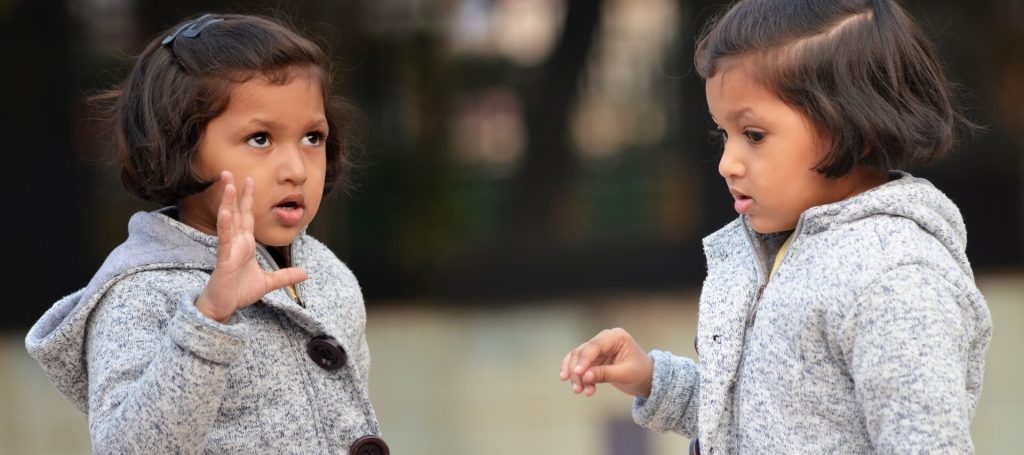
There are several signs that may indicate a speech delay in young children.
One of the most common signs is a lack of cooing and babbling. By six months of age, most babies are able to make a variety of sounds, including cooing and babbling. If your twins are not making any sounds by six months, it may be a sign of a speech delay.
Another common sign is that your twins have a very limited vocabulary. Your twins may repeat words or phrases over and over again instead of using a variety of words to communicate. They may use only a few consonant sounds or may substitute one sound for another. If your twins are not using any real words or if they are using very limited words after completing a full rotation around the sun, you might want to consult with a pediatrician or a speech-language pathologist.
Moreover, your twins may have difficulty following directions or understanding what is being asked of them. For example, if you tell them “Go to your room, get your shoes, and bring them to me,” they may only hear “Go to your room” and not understand the rest of the directions.
You may also notice that your twins have difficulty interacting with others, which can lead to a lack of social interaction. For example, if they are unable to ask for toys or express their needs and wants, they may struggle to engage with peers. Your twins may also have difficulty understanding social cues and nonverbal communication. For example, if they do not understand when someone is smiling or making eye contact, they may not know how to respond.
If you are concerned about your children’s language development, it might be best to consult with a professional. However, it is important to note that every child develops at their own pace, and some children may simply be “late bloomers” when it comes to language development.
Five Ways To Address Speech Delay
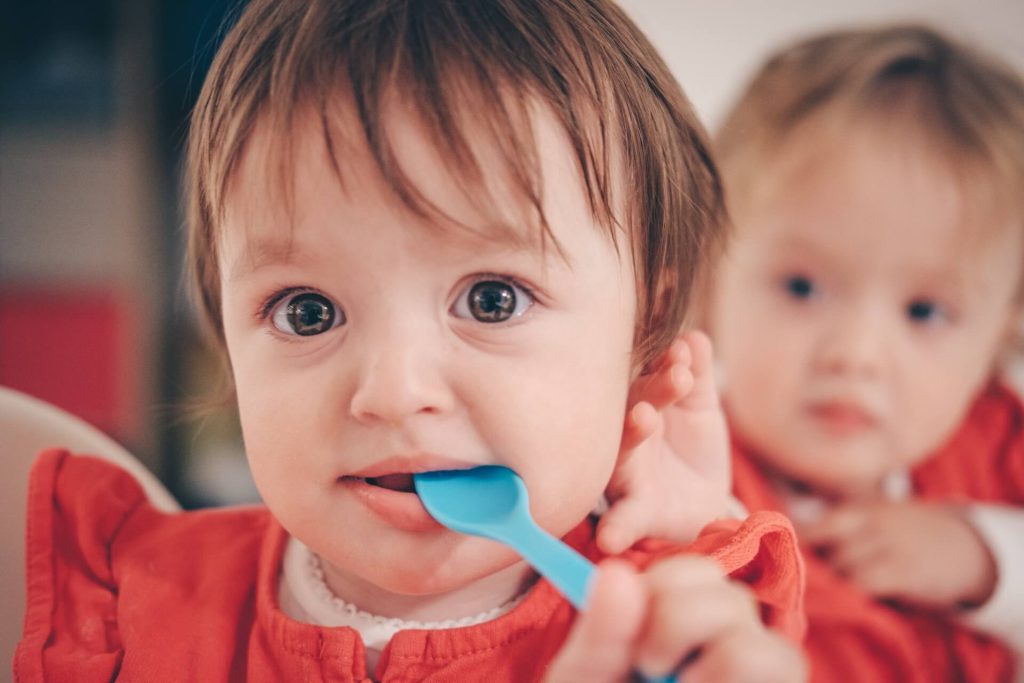
If you suspect that your twins have a speech delay, there are several things you can do to address it:
- Talk to your pediatrician: The first step is to talk to your pediatrician about your concerns. They can evaluate your twins’ language development and refer you to a speech-language pathologist for further assessment.
- Work with a speech-language pathologist: A speech-language pathologist can work with your twins to improve their language and communication skills. They can develop a personalized therapy plan that is tailored to your twins’ needs.
- Encourage communication: Encourage your twins to communicate with you and with each other as much as possible. Spend time reading to them, talking to them, and engaging them in conversation.
- Use visual aids: Visual aids, such as pictures, can help your twins learn new words and concepts. You can use picture books or flashcards to help them learn new words.
- Create a language-rich environment: Create an environment that is rich in language and opportunities for communication. Play games that involve language, such as “I Spy,” and expose your twins to a variety of experiences that can expand their vocabulary and understanding of the world.
FAQ
Is speech delay more common in twins than singletons?
Research suggests that speech delay may be more common in twins than in singletons. One study found that twins were almost twice as likely as singletons to experience speech delay, with a prevalence of 16.9% among twins compared to 8.9% among singletons. However, the exact reasons for this increased risk are not fully understood.
There are several factors that may contribute to the increased risk of speech delay in twins. For example, twins may experience more competition for attention from parents and caregivers, which could lead to less time spent engaging in language-rich activities such as reading and conversation. Twins may also be more likely to have a low birth weight or premature birth, both of which are risk factors for developmental delays, including speech delay.
However, every child, whether a twin or singleton, develops at their own pace, and not all children will experience speech delay.
Do both twins experience speech delay?
It is not necessarily the case that both twins will experience speech delay. Each twin is an individual with their own unique developmental trajectory, and factors such as genetics, birth order, and environmental influences can all play a role in their language development.
While speech delay may be more common in twins than in singletons, it is still possible for one twin to experience speech delay while the other does not. In fact, it is not uncommon for twins to have different developmental trajectories, with one twin reaching developmental milestones earlier than the other.
At what age is speech delay diagnosed?
Speech delay can be diagnosed at different ages depending on the severity of the delay and the age at which the child begins to show signs of delay. Generally, if a child is not meeting expected language milestones for their age, it may be an indication of speech delay. However, it’s important to remember that every child develops at their own pace, and not all children will reach milestones at the same time.
Speech delay may be diagnosed as early as 18 months of age when a child’s language development is typically assessed by a pediatrician or other healthcare provider. However, speech delay may not be diagnosed until a child is 2-3 years old when delays in expressive language become more noticeable. If a child is still not speaking in simple sentences by age 3, it may be an indication of speech delay.
Is speech delay more common in fraternal twins or identical twins?
Research suggests that speech and language delays are more common in fraternal twins (dizygotic twins) than in identical twins (monozygotic twins).
This may be due to the fact that fraternal twins are no more genetically alike than any other siblings and are more likely to have different experiences, such as differences in maternal interactions or prenatal conditions, which can impact language development.
In contrast, identical twins share the same genetic makeup and may be more likely to have similar developmental trajectories.
Is speech delay treatable?
Yes, speech delay can be treated and in many cases, significantly improved or resolved. However, the extent of improvement or resolution may depend on the underlying cause and the severity of the delay.
Speech therapy is a common treatment for speech delay, and it can be very effective in helping children improve their language skills. A speech-language pathologist (SLP) can work with your child to identify areas of difficulty and develop a personalized treatment plan.
The SLP may use a variety of techniques, such as play-based activities, exercises to strengthen the muscles used in speech, and drills to practice specific sounds or words.
Conclusion
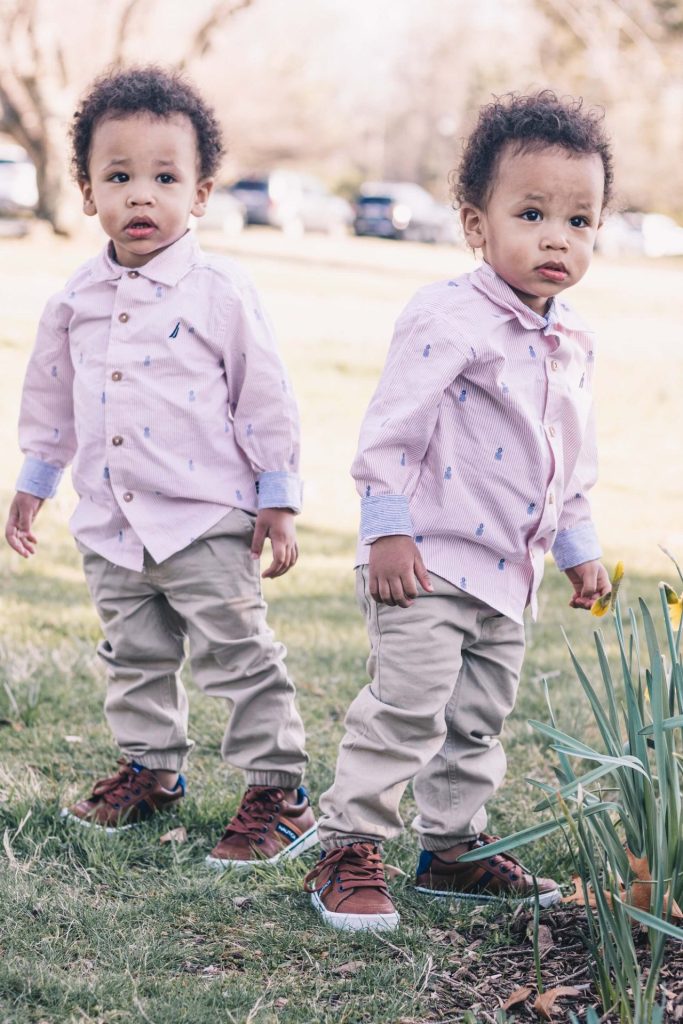
In conclusion, speech delay can be a common issue for twins. Identifying the signs of speech delay early on and seeking appropriate treatment, such as speech therapy, can greatly improve a child’s language development and communication skills.
With proper support and consistent practice, most children with speech delay, including twins, can make significant progress and reach their full potential.




